News of the Week: Blockbuster, the World Series of Poker, and Why You’re Storing Bread Wrong
One Is the Loneliest Number
All the things we used to love are going away.
Post Archive Director Jeff Nilsson highlighted some of them in this piece from earlier this year, and in addition to things like neighborhood mailboxes, department stores, and bank branches, he included Blockbuster Video. He mentioned that there were 10 Blockbuster stores left (there were almost 9,000 in its heyday), with seven of them being in Alaska. As of a few weeks ago, there were only two left in Alaska, and those two stores closed last week. What all that video store math means is that there is now only one Blockbuster left anywhere, and I’m running it out of my apartment.
Well, no. Actually, the last Blockbuster is in Bend, Oregon. Yup, you can still go there and rent movies! In an odd way, the closing of all of the Blockbuster locations might be a blessing to the last location, because now they’re getting a lot of press for being the last one, and maybe they’ll get more customers, the ones who might want to go there out of a feeling of nostalgia or don’t want to stream or rent from that Redbox at the supermarket. CBS’s Jamie Yuccas visited the store and filed this story.
All In
Poker isn’t as popular as it once was. There actually might be more people playing it these days — especially online — but it’s not as “hot” as it was 10 or 15 years ago, when ESPN and other networks started televising tournaments and a different kind of “sports” star emerged. It pretty much started when unknown Chris Moneymaker (such a perfect name) won the World Series of Poker in 2003. He made people think they could win too.
This year’s winner was crowned last week at the Rio All-Suite Hotel and Casino in Las Vegas. John Cynn beat Tony Miles in an epic showdown that lasted 10 ½ hours and 442 hands, including a spectacular made-for-TV hand where Miles made a successful $95 million bluff.
Cynn won $8.8 million and a nice World Series of Poker bracelet. He had a nice run in 2016 too; he came in 11th.
On Broadway
There’s a scene in the original 1933 film version of King Kong where the giant ape is unveiled on stage at a Broadway theater. I’ve always wondered why the people who captured Kong would unveil him in that matter (with all those people, not knowing how strong he is?). But it’s a great idea and a great visual: A giant ape on a stage in front of an audience escapes and goes on a rampage.
Now we’ll be able to experience that same scene with King Kong: Alive on Broadway, the Broadway version of a show that ran in Australia and has been in the works for several years. It’s going to include some impressive animatronics and special effects, as this Hollywood Reporter behind-the-scenes video illustrates.
Green Acres: The Musical
It probably won’t be as exciting as King Kong, but maybe you’d like to see a stage show based on a ’60s sitcom.
We could probably think of a lot of TV sitcoms that might work as stage musicals. Bewitched and I Dream of Jeannie come immediately to mind, not only for the plots and settings that would lend themselves to the stage, but also for what they could do with the magic scenes. But I wouldn’t have thought at all that Green Acres would be coming to Broadway, though that’s exactly what is in the works.
If you don’t remember the show, lawyer Oliver Douglas and his wife Lisa move from New York City to a small-town farm. He wants to do it; she hates the idea. Wacky chaos ensues. The official press release for the stage show says, “What happens when two people in love find themselves wanting opposite lives sends us on a journey that is both hilarious and filled with heart.” That certainly sounds more ambitious than the TV show.
Coming soon: F Troop: Alive on Broadway!
Blondie Won’t Be Coming to Blu-ray (Not Yet Anyway)
You might be familiar with the series of Blondie movies released in the 1940s, based on the classic comic strip. Turner Classic Movies runs them. You might not know that there was a TV series in 1957, however. It starred Arthur Lake and Pamela Britton and ran for 24 episodes. Recently there was a campaign to get the series released on Blu-ray and … well, it failed.
David Kawas, founder of ClassicFlix, created a Kickstarter for the project, which needed to reach $20,000. Unfortunately, when the campaign ended last week, it had only reached $6,626. Oh well. Maybe he’ll try it again in the future.
Interestingly, there was also a 1968 Blondie sitcom that ran for only 13 episodes.
How Do You Store Bread?
That may seem like an odd question, but not if you think about it. There are many ways to close and store a bag of bread, as shown in this illustration by graphic designer Kallista Zhang. Which do you do?
We're all in agreement here that chaotic neutral is the most efficient and easy way to store bread, right? pic.twitter.com/EtdSi2WGS0
— Josh Jordan (@NumbersMuncher) July 12, 2018
I’m a Lawful Neutral person (even if the artist did confuse things by calling the twist tie that comes with bread a “bag clip,” which is a different thing). I don’t trust Chaotic Evil people.
RIP Nancy Sinatra Sr., Roger Perry, and Ron Satlof
Nancy Sinatra Sr. was the first wife of Frank Sinatra and the mother of his three children (Nancy, Frank, and Tina). She died last Friday at the age of 101.
Roger Perry was a veteran actor who appeared on such shows as Star Trek, Arrest and Trial, The Facts of Life, and Falcon Crest, as well as cult classic movies like The Thing with Two Heads and Count Yorga, Vampire. He died last week at the age of 85.
Ron Satlof was an assistant director on the Martin Scorsese film Mean Streets and director of eight Perry Mason TV movies and dozens of episodes of other shows. He died earlier this month at the age of 79.
This Week in History
First Atomic Bomb Test (July 16, 1945)
The test, code-named “Trinity,” happened in the New Mexico desert and was the result of years of testing as part of the secret Manhattan Project.
The Catcher in the Rye Published (July 16, 1951)
The classic J.D. Salinger novel is one of those books that every American should read, and you can for free at the Internet Archive.
This Week in Saturday Evening Post History: Lookout Point (July 18, 1953)
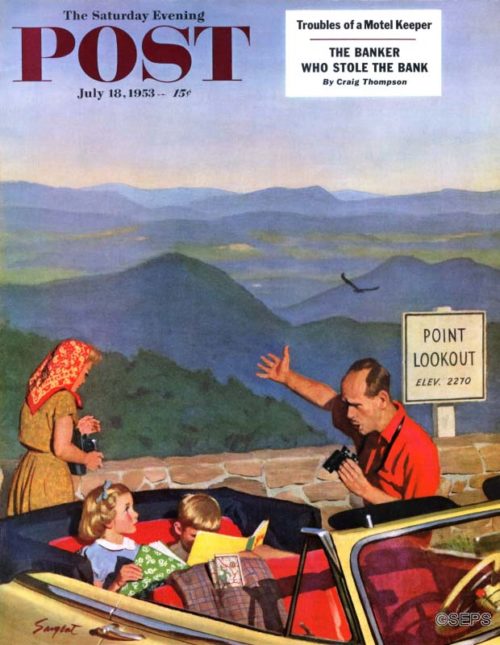
Richard Sargent
July 18, 1953
This Richard Sargent cover shows a family on Point Lookout at Lookout Mountain in Tennessee. Point Lookout is now called Sunset Rock.
How dare those kids actually have their noses in books! Today, those kids would be on their phones.
Quote of the Week
“Order Restored: The Guy in the Office Who Was Always Watching the World Cup Is Back to Having Nothing”
—headline at ClickHole, sister site of The Onion
Fortune Cookie Day
I don’t eat as much Chinese food as I used to, so I haven’t opened a fortune cookie in a few years (the person who delivers my pizzas never has any fortune cookies). Today is Fortune Cookie Day, and you can celebrate in one of two ways. You can order some Chinese food tonight and get one, or you can play with this online fortune cookie generator.
I got “A great person was born on your birthday.” It’s nice if they’re talking about me, but they’re probably referring to Cole Porter.
Next Week’s Holidays and Events
Shark Week (starts July 22)
This is the 30th anniversary of Discovery Channel’s annual extravaganza of shark-related programming. Here’s the Post’s Bill Newcott with a montage of great film and TV moments involving sharks.
System Administrator Day (July 27)
If your company’s computer network is up and running, this is the day to thank your SysAdmin.
The 10 Biggest Underdogs to Win a Championship
There are a few cases in sports history where teams or individuals have walked into high pressure games as heavy underdogs, but they manage to walk out as champions. Here are ten underdogs who beat the odds and became legends.
- Holly Holm defeats Ronda Rousey (2015)

Undefeated UFC women’s bantamweight champion Ronda Rousey walked into UFC 193 a heavy favorite. In the preceding three years, Rousey easily made her way through the women’s division. Very few UFC experts or pundits gave her opponent Holly Holm a fighting chance.
Holm said she knew that Rousey was going to start the fight with a lot of aggression. In a post-game press conference she said, “I expected her to be aggressive and impose her will on me.” For Holm, the key to winning the fight was avoiding Rousey’s devastating armbar.
Early in the second round, Holm was able to land a well-placed kick to Rousey’s head. As Rousey fell to the mat, Holm began to circle the octagon with an expression of pure joy on her face. She knew she had just proven the experts wrong.
- Alexander Rossi wins the 100th Indianapolis 500 (2016)

In what was already a high-pressure day for IndyCar drivers, the 100th running of the “Greatest Spectacle in Racing” only added to their stress. In a field crowded with legendary Indianapolis 500 drivers, such as Helio Castroneves, Juan Pablo Montoya, and Tony Kanaan, Alexander Rossi was not high on the list of potential winners. When betting opened for the race, he was given 100–1 odds to win.
Thanks to a smart decision to not come in for more fuel with ten laps to go, Rossi managed to outlast his competition in a race that saw almost a quarter of the field unable to finish. The Indianapolis 500 is often a race of attrition. It’s not always the fastest car or the best driver who wins. On this day, Rossi and his team had a lot of luck on their side.
With his win, Rossi became the first rookie in 15 years to win the Indianapolis 500.
- Houston Rockets win the NBA Championship (1995)
Even though they won the NBA championship in 1994, no one expected the Houston Rockets to repeat the next year. Michael Jordan and his Chicago Bulls were the dominant force in the NBA, winning three out of the last four NBA Championships. Now that Jordan was retired (temporarily), other teams in the league saw a major opportunity to win the NBA Finals.
The biggest challenge facing the Rockets was the makeup of their roster. Aside from future basketball Hall of Famer Hakeem Olajuwon, the Rockets were comprised mostly of average level talent.
The Rockets entered the 1995 NBA playoffs as the No. 6 seed in the Western Conference. They went on to beat the top-seeded San Antonio Spurs in the conference finals, and then they swept the No. 1 seed Orlando Magic in the NBA finals.
- New York Jets Win Super Bowl III (1969)
In the first professional football championship game that was officially called the “Super Bowl,” the New York Jets entered the game as an 18-point underdog. With a betting line that had them losing by more than two touchdowns, few were expecting the Joe Namath-led Jets to put up much of a fight against Johnny Unitas and the Baltimore Colts.
Namath entered the game having thrown more season interceptions (17) than touchdowns (15). It also did not help that Namath had a well-known “playboy” reputation. His late night parties with celebrities were often the talk of the town.
Despite a Jets roster that was seen as mostly inferior to the Baltimore Colts, Namath decided to walk into the Miami Touchdown Club and make a bold prediction: “We’re gonna win the game. I guarantee it.” This declaration just days before the big game may have been the spark that led the Jets to beat the Colts 16-7.
- New York Mets Win World Series (1969)

At the start of the 1969 season, the New York Mets were given 100-1 odds to win the National League pennant. The previous year, the Mets finished in ninth place. Many fans still could not fathom the thought of the Mets putting up any kind of a fight in the National League. Little did those fans realize, the Mets had an influx of young talent and future Hall of Famers.
The 1969 Mets had one of the best pitching lineups of the season, including Nolan Ryan and Tom Seaver. Buoyed by solid hitting from Tommie Agee and Cleon Jones, the Mets would go on to win the NL East with an eight-game margin. But as they entered the World Series, the odds were still stacked against them.
The Mets would have to travel to Baltimore to face the odds-on-favorite Orioles in the World Series. To the shock of many, the Mets went on to win the World Series in only five games. The improbable season led to the team earning the nickname “The Amazing Mets.”
- New York Giants Win Super Bowl XLII (2008)
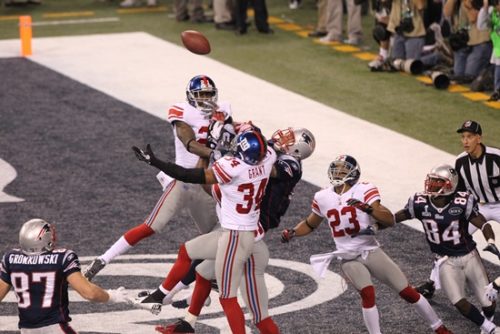
How do you defeat an undefeated team? This was the question the New York Giants had to answer when facing the New England Patriots in Super Bowl XLII. For many football fans, it seemed the destiny of Tom Brady, Bill Belichick, and their New England Patriots to finish the 2008 season with a perfect record.
While the Patriots were trying to become the first undefeated team since the 1972 Miami Dolphins, the New York Giants had a very different route to the championship game. With a 12-4 regular season record, and having not won a playoff game in seven years, the Giants entered the Super Bowl as 12-point underdogs.
New York Giants quarterback Eli Manning threw for two key touchdowns in the fourth quarter and finished the game with 255 passing yards. The real highlight of the game came with just over one minute left in the fourth quarter. The Giants needed to score a touchdown to take the lead. Manning dropped back for a pass as New England Patriots defenders pulled at his jersey, trying to wrestle him to the ground. Manning managed to escape and lobbed a 32-yard pass to receiver David Tyree, who caught the ball by wedging it between his right hand and his helmet. The “Helmet Catch” is considered one of the greatest plays in Super Bowl history. It only added to the legend of a game that saw the New York Giants go on to defeat the “undefeated” New England Patriots 17-14.
- Villanova Wins the NCAA Men’s Basketball Championship (1984)
The 1984 Georgetown Hoyas men’s basketball team included legendary coach John Thompson Jr., future basketball Hall of Famer Patrick Ewing, and a strong supporting cast of players. On the other side of the court stood the polar opposite of the Georgetown Hoyas.
Heading into the 1984 NCAA Men’s Basketball Tournament, the Villanova Wildcats had a mediocre 25-10 record. The team finished the regular season unranked and was fourth in Big East standings. Few expected the Wildcats to make it all the way to the NCAA championship game.
If Villanova wanted to beat Georgetown for the championship, they had to play a perfect game; and that is exactly what they did. That night, Villanova shot an incredible 79 percent from the floor, a percentage that has yet to be matched in a championship game.
- Chicago White Sox Win the World Series (1906)

The Chicago Cubs spent the 1906 MLB season racking up the most regular-season wins in baseball history (116), coasting to the National League pennant. Their cross-town rivals, the Chicago White Sox, spent most of that season earning the nickname “The Hitless Wonders.” The White Sox amassed the worst batting average in the American League (.230), and 23 fewer wins than the Chicago Cubs.
As both teams began the 1906 World Series, it was all but settled that the Cubs would easily rout the White Sox and win the World Series. The White Sox had different plans and managed to beat the Cubs in six games. It was a historic World Series upset. The victory was even more surprising because the “Hitless Wonders” managed to have an even worse batting average in the World Series (.198).
- Donerail Wins Kentucky Derby (1913)

The Kentucky Derby is known as the “fastest two minutes in sports.” Each year, thousands of people wager on the fastest horses in America. One of the most exciting things about the Kentucky Derby is the ability to win big on a long-shot bet.
In 1913, some very lucky people won big by betting on the 91-1 underdog horse, Donerail. Leading up to the race, Donerail was an unknown commodity who had no high profile victories on his record. After leading Donerail to victory, the jockey, Roscoe Goose, earned the nickname “Golden Goose.”
Just a $2 bet on the underdog horse would have netted you $184.90. To this day, the victory stands as the biggest upset in Kentucky Derby history.
- Buster Douglas Beats Mike Tyson (1990)
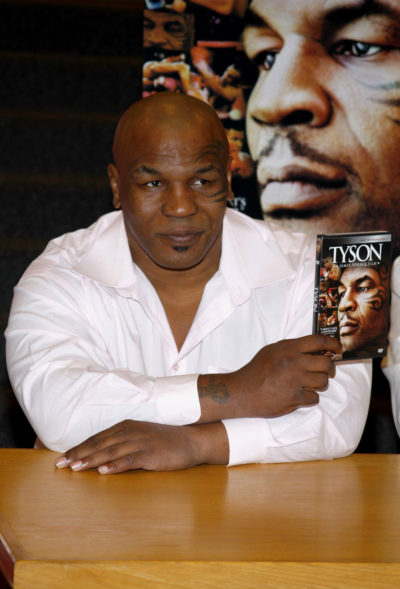
Many sports fans remember where they were in 1990 when underdog Buster Douglas knocked out Mike Tyson. It was a moment in sports that is frozen in time, and it is remembered by many as the most stunning upset in sports history.
The historic fight took place in the Tokyo Dome in Japan. Mike Tyson entered the fight undefeated (39-0) and was the WBC undisputed heavyweight champion. His opponent, James “Buster” Douglas, was considered just another contender that Tyson would easily vanquish. Douglas entered the fight with four losses and one draw.
In the ninth round, both Douglas and Tyson were tired and growing weaker by the second. Douglas suddenly landed a powerful right uppercut and a series of jabs to the head of Tyson. It was over. Tyson tried in vain to answer the official’s ten count, but Douglas’ final barrage was too much. Buster Douglas walked into the Tokyo Dome a 42-1 underdog, and he walked out a champion.
News of the Week: 86 Candies, 50 Years of ‘On the Road,’ and Norman Lloyd at 103
No Zagnut?
It’s four days after Halloween and you probably have some candy left over. I bought Reese’s Peanut Butter Cups and Almond Joys this year, even though trick-or-treaters haven’t come to my place since the late ’90s.
The former just happens to be the No. 1 Halloween candy, according to this list compiled by the website FiveThirtyEight, known for their election polls and political analysis. No. 2 was the miniature version of the Reese’s Peanut Butter Cup, which seems like a rather unfair advantage for Reese’s. Twix, Kit Kat, and Snickers round out the top five. Junior Mints are at No. 25, Baby Ruth is at No. 27, and a quarter (thrown into the mix just to see if money is more important than candy) beat out Twizzlers and Werther’s Originals. Coming in dead last? Good & Plenty. Kids today just don’t appreciate pill-shaped licorice candy from the 1890s.
Maybe Twix would have won if it had visited Wisconsin and Michigan.
On the Road
No, not the Jack Kerouac novel — the CBS News segment started by Charles Kuralt in 1967. Steve Hartman does it now, and he did this 50th-anniversary tribute to Kuralt and the big van he used to travel around the country.
The Dickinson Pumpkin
Every now and then, a big food controversy arises. We’ve seen the yams vs. sweet potato debate, the Great Green Pea Scandal of 2015, and this year we have CheeseburgerGate. Now comes another one, just in time for Thanksgiving and Christmas.
It seems that the cans of “100% pumpkin” you see on supermarket shelves may, in fact, include meat from something called a Dickinson pumpkin, which is really a type of squash. That’s right, all these years you’ve probably been making your pumpkin pie with squash. But wait! It might not be as much of a scandal as people think, because the FDA says that it’s actually okay if cans of pumpkin are sometimes made with squash or a mixture of pumpkin and squash.
Which is a relief, because “squash pie” just doesn’t sound as appetizing.
Katie Who?
Everybody knows the lyrics to the baseball song “Take Me Out to the Ball Game,” often sung during the seventh-inning stretch, right? But you probably don’t know all the lyrics.
The song, written by Jack Norworth in 1908, was actually about a young woman named Katie who wants to go to a baseball game, even though it was mostly men who went to games back then. There’s actually an opening line from the song that nobody ever sings and most people don’t even know about, but CBS News has all the details.
The next time you go to a ball game you can sing the line and confuse your friends and all the strangers around you. Hey, did you say Katie? Who’s Katie?
Happy 103rd Birthday, Norman Lloyd!
Norman Lloyd is an actor and director you may know from St. Elsewhere (he played Dr. Auschlander) and as the bad guy who falls from the Statue of Liberty in Alfred Hitchcock’s terrific 1942 thriller Saboteur. He’s also a big baseball fan. When he was 11 he saw Babe Ruth play in the 1926 World Series and, amazingly, he also went to this year’s World Series to see the Dodgers play the Astros!
He’s there! Norman Lloyd, who attended World Series Game 1 in 1926, is at Game 2 in 2017! https://t.co/SHbcaKkBHV pic.twitter.com/3kBbUUUBEi
— Keith Olbermann (@KeithOlbermann) October 26, 2017
He turns 103 next Wednesday, and his new TV series, Fly, premieres next year.
Dead Celebrities Make More Money Than You Do
You could probably have guessed that Michael Jackson made a lot of money this past year ($75 million), but I bet you can’t guess who No. 2 on the list is. Come on, guess. Forbes has the 2017 list of the celebrities no longer with us who still make a lot of money, and No. 2 genuinely surprised me.
No, it’s not Peanuts creator Charles Schulz, nor is it Elvis Presley. They come in at No. 3 and 4, respectively. Musician Bob Marley is No. 5, and Tom Petty, who just passed away a few weeks ago, is No. 6.
Seriously, before you click this link to see the whole list, try to guess who No. 2 is. Betcha a Zagnut you can’t.
This Week in History
Stock Market Crashes (October 29, 1929)
It’s referred to as “Black Tuesday,” but it actually started a week before on “Black Thursday.” The financial disaster, of course, led to the Great Depression.
Assassination Attempt on President Truman (November 1, 1950)
Two members of the Puerto Rican Nationalist Party tried to shoot Truman at the Blair House, where the Truman family was staying while the White House was being renovated.
This Week in Saturday Evening Post History: Clock Repairman (November 3, 1945)
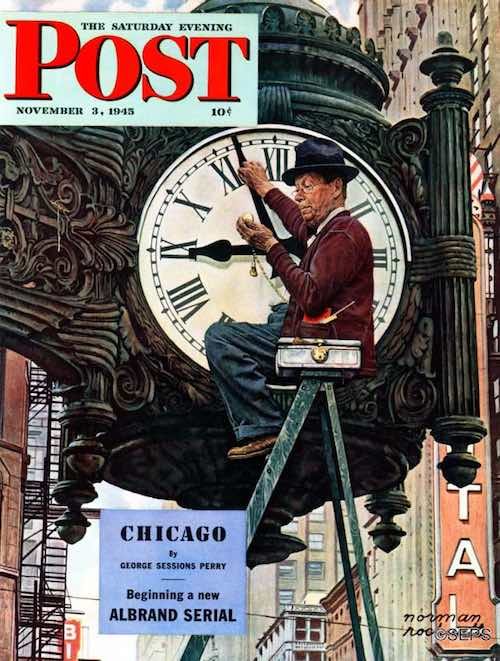
Norman Rockwell
November 3, 1945
Maybe this cover by Norman Rockwell can serve as a reminder that you have to turn back your clocks one hour before you go to bed on Saturday night.
Today Is National Sandwich Day
Parade has a list of the sandwich places that have special deals today, including Subway, Capriotti, QuickChek, and Firehouse. I’d like to highlight one particular sandwich. It was the favorite of writer and actress Peg Lynch, the woman who pretty much created the sitcom with shows like Ethel and Albert and The Couple Next Door. I don’t know if it’s something I’d want to try (I’m not a big mayo guy), but I think you should test it and report back to us.
- 2 slices Arnold white bread, toasted and buttered
- iceberg lettuce
- smooth peanut butter
- Miracle Whip
Put sandwich together, cut off crusts, cut into four triangles, and enjoy!
Next Week’s Holidays and Events
Guy Fawkes Day (November 5)
Fawkes is known as one of the biggest villains in British history. You may know his face as the mask many people wear when they’re doing something they don’t to be known for, as seen in the graphic novel and film version of V for Vendetta.
General Election Day (November 7)
Here’s a list of some of the important federal, state, and local elections that are happening on Tuesday.
News of the Week: Expensive Peanuts, Free Tacos, and Spiders You Can Actually Eat
MetLife Nixes Peanuts
I don’t know how the Peanuts gang ended up as the spokespeople (spokescharacters?) for an insurance company 30 years ago, but it’s going to be sad to see them go. MetLife has decided to end their relationship with Charles Schulz’s popular creations, for which they pay over $10 million a year to license. The company is going to be rebranding itself as it spins off its individual life insurance plans in the U.S. in 2017.
In related news, rebranding is one of my least favorite words ever.
Thanks, Francisco Lindor!
Even though the World Series is currently tied at one game apiece, there are already winners, and they are us. Because Cleveland Indians shortstop Francisco Lindor stole a base in game one on Tuesday night (sorry, Cubs fans), everyone gets a free taco at Taco Bell next Wednesday, November 2, between 2 and 6 p.m.
If a player steals a base in the #WorldSeries, America gets free #DoritosLocosTacos. Who will be our taco hero? https://t.co/ZxGL0QoJRB pic.twitter.com/cWIxXGHXbl
— Taco Bell (@tacobell) October 20, 2016
This promotion was based on stealing just one base in the entire World Series? Taco Bell must really love to give away tacos.
Is Coupon Pronounced “Koopon” or “Q-pon”?
It’s “koopon.” Hey, that was easy!
Well, okay, there’s more to the story. Over at Slate they’re debating whether coupon should be pronounced “koopon” or “Q-pon” (they write it out as “cyoopon,” but that’s just confusing). I hadn’t even heard of the second pronunciation until a friend of mine who travels the country selling coupons told me that he encounters many people who pronounce it “Q-pon” and it drives him crazy. I thought that it might be a regional thing, different areas of the country saying it a different way like we do many other words, but I don’t think that explains it. Coupons.com did a poll five years ago, and 57% of the people said they pronounce it “Q-pon.” I don’t know any of those people.
The writer of the Slate piece says “Q-pon.” His wife says “koopon.” Wars have started over disagreements like this.
I’m So Glad We’re Gonna Spend More Time Together

One of my favorite childhood memories is watching the Saturday-night lineup on CBS in the ’70s. It’s hard to convince younger people today, when Saturday-night network television is for repeats and movies and maybe some news shows, that the night used to be worth staying in for. All in the Family, The Bob Newhart Show, The Mary Tyler Moore Show, and The Carol Burnett Show all aired on one night and on one channel. Pre-VCR, who would want to go out and miss that lineup?
Burnett, who was interviewed for our upcoming January/February issue, is coming back to television. She’ll star in a new ABC sitcom produced by Amy Poehler. It’s about a family who gets to buy a great house really cheap, but on one condition: They have to live with the woman (Carol Burnett) who currently owns the house.
Click Your Heels Together Three Times …

What happens when an iconic movie prop is decaying and you don’t have the money to repair it? You start a Kickstarter.
That’s what the Smithsonian did. They wanted to restore Dorothy’s ruby slippers from The Wizard of Oz, so they started a crowdsourcing campaign. They ended up raising more than $300,000! They’re also raising money to restore Ray Bolger’s Scarecrow costume from the movie.
They actually made as many as 10 pairs of ruby slippers for the movie. One pair was stolen, and another pair was sold at auction. These Smithsonian shoes are the ones Judy Garland used the most in the movie, especially in the dance sequences.
RIP Kevin Meaney, Bobby Vee, Kevin Curran, Kathryn Adams, and Pete Burns
I can still remember, vividly, Kevin Meaney’s HBO standup special in the ’80s. It was one of the first things I ever watched on cable, and some of his lines really stick in my mind: “That’s not night!” and “We’re big-pants people!” (There’s another line from the special that’s also really memorable, but I can’t repeat it on a family website.)
Meaney passed away last Friday at the age of 60. Many comics have penned tributes to the influential comedian, including Louis C.K.
Bobby Vee, who passed away Monday at 73 will be remembered for the song “Take Good Care of My Baby,” but he had another tie to history. In 1959, at the young age of 15, he filled in at a concert in Moorhead, Minnesota, after Buddy Holly, J.P. “The Big Bopper” Richardson, and Ritchie Valens were killed in a plane crash.
Kevin Curran was a producer and writer for The Simpsons from 1998 to 2015. He was also a producer/writer for Married…with Children, Unhappily Ever After, and The Good Life, and for many years was a writer on Late Night with David Letterman. In fact, he wrote Letterman’s very first Top 10 List, “10 Things That Almost Rhyme with Peas.” He won three Emmys for The Simpsons and three for Late Night.
Curran was just 59 years old. He passed away Tuesday after a long illness.
Kathryn Adams appeared in such movies as The Hunchback of Notre Dame, Saboteur, If I Had My Way, and The Invisible Woman, but she quit show business in 1946 to focus on her family and her husband, Leave It to Beaver’s Hugh Beaumont. She passed away this week at the age of 96.
You might not remember the name Pete Burns or his band Dead or Alive, but their most famous song has had amazing lasting popularity since its release in 1985. It was even used recently in a commercial for a Candy Crush game.
Burns died of a heart attack at the age of 57.
This Week in History: Black Thursday (October 24, 1929)
The Wall Street Crash of 1929 is usually referred to as “Black Tuesday,” but the events that led to the stock market disaster and the Great Depression actually started on Thursday of the week before. To make things even more confusing, Monday of that week is called “Black Monday.”
This Week in History: Statue of Liberty Dedicated (October 28, 1886)
Saturday Evening Post archive director Jeff Nilsson has a nice piece on our national symbol of freedom, a gift from the people of France.
This Week in History: Dr. Jonas Salk Born (October 28, 1914)
Salk’s injectable polio vaccine was released to the public in 1955. A few years later, medical researcher Albert Sabin came up with the oral version.
Spiders Aren’t as Scary If You Can Eat Them
In the past, I’ve given you various recipes for Halloween, including bat wings, pumpkin muffins, ghostly milk shakes, and fingers from a witch. This year, I thought I’d focus on arthropods.
Here’s a recipe for Spider Chocolate Chips Cookies, and here’s one for Oreo Spider Web Cookie Pizza. This recipe is for Scary Spider Web Eggs, and it’s so odd-looking that it might just freak people out.
I live in New England, born and raised, but I’ve never heard of New England Spider Cake. But apparently it’s a thing, and here’s the recipe. It’s a creamy cornbread you top with maple syrup.
Note: It has nothing to do with spiders.
Next Week’s Holidays and Events
Halloween (October 31)
Here are some of the great Halloween covers we’ve done over the years. (My favorite is the November 1, 1958, cover by John Falter.)
National Alzheimer’s Awareness Month starts (November 1)
Check out the Alzheimer’s Association website to find out how you can volunteer and find walks in your area.
National Novel Writing Month starts (November 1)
Or NaNoWriMo for short. I’ve never attempted to write a whole novel in a month, but it can be done.
World Series
Whether a Mets fan, a Royals fan, or a disheartened Cubs fan — let’s face it. No one is completely immune to the lure of the October jamboree.
Serious Business
When the Series is on, pretty much everything stops.
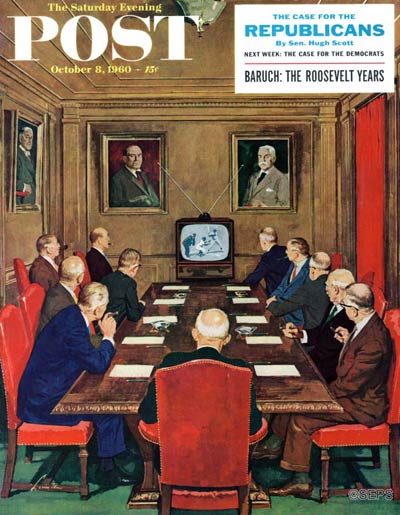
Lonie Bee
October 8, 1960
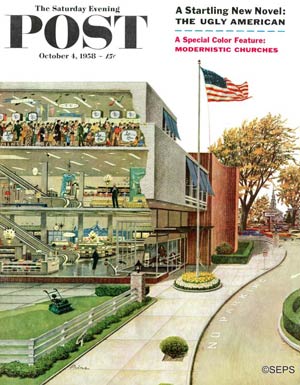
Benjamin Kimberly Prins
October 4, 1958
America’s Fall Tonic
by Bozeman Bulger
The Saturday Evening Post, October 3, 1931—This October tonic, sipped for a week or 10 days, helps to locate old friends and create new ones, loosens the vocal cords, and causes excessive though pleasant loss of sleep.
The greater the business depression, the better this tonic seems to taste. Your American sports lover, or just plain American, may tighten up on some expenditures, but when it comes to settling his baseball championship and seeing it well done, he simply cuts the strap on his bank roll and lets go. Even those who cannot attend to the matter in person suffer bites from the germ. They huddle around radio sets, telegraph offices, and bulletin boards.
In the World War, soldiers in far-off France were able to forgo immediate interest in battles while taking a sip of the Series by telegraph and airplane bulletins. High-ranking generals who provided this tonic are said to have enjoyed a liberal sip themselves.
What Matters
Family’s important, and romance is great—but right now there’s a game on.
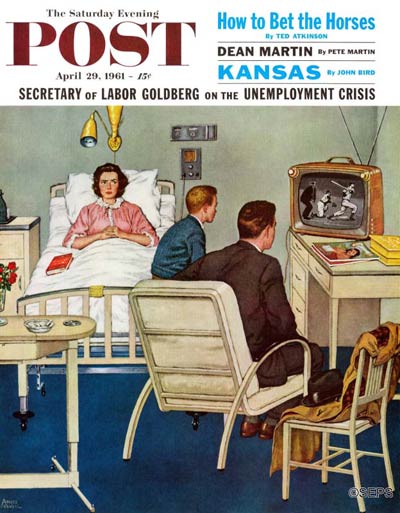
Amos Sewell
April 29, 1961
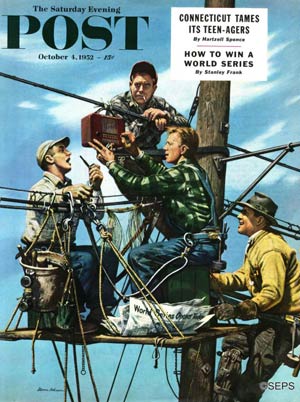
Stevan Dohanos
October 4, 1952
World Series Poison
by Stanley Frank
The Saturday Evening Post, October 3, 1942—Considering the caliber of players involved, the World Series has produced a great deal of shockingly bad baseball. Ridiculous boners are committed in World Series competition for a thoroughly understandable reason. The players are under enormous pressure. The greatest stars blow apart at the seams. There is something terrifying in the realization that every move is a focal point for second guessing, that every gesture is under critical scrutiny. How severe is this pressure?
“Greater than the fan will ever know or a ballplayer will ever admit,” the Yankees’ [manager] Joe McCarthy declares. “Every man responds differently to the World Series and there’s no way of telling in advance how he will react. He doesn’t know, himself. It’s like being held up by a guy with a gun for the first time. No man knows what he’ll do until he goes through the experience.
“The simple truth is that no ballplayer takes the World Series in stride. You hear — I’ve told it to teams myself — that the World Series is just another ball game. That’s nonsense. There is nothing in baseball to compare with the tension of the World Series and nothing can prepare a man for it. Some stars curl up under the pressure and others are stimulated.”
Precarious Perch
What risks will a young boy take to get a good view of the game?
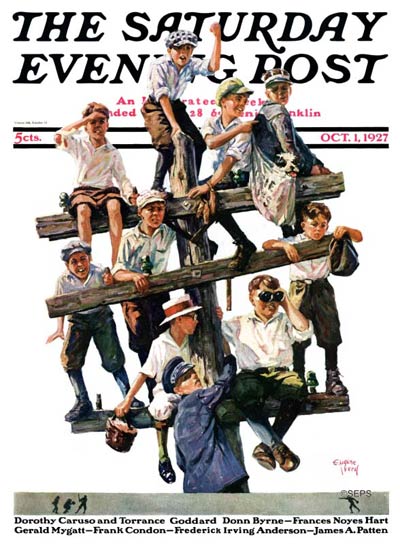
Eugene Iverd
October 1, 1927
Catch and Release
For a few years during WWII, civic duty trumped self-interest. Fans lucky enough to catch a ball were encouraged to throw it back, so it could be given to those in the armed services.
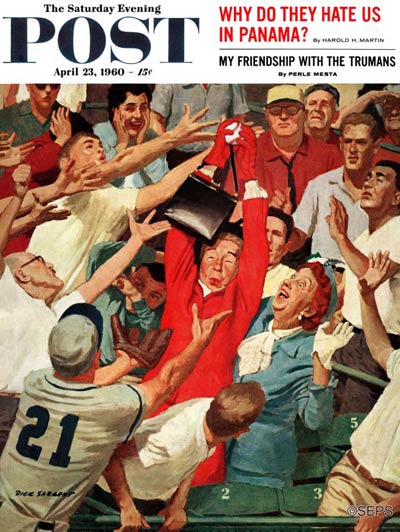
Richard Sargent
April 23, 1960
Field of Vision
Sometimes it’s worth fighting for a reasonable line of sight.
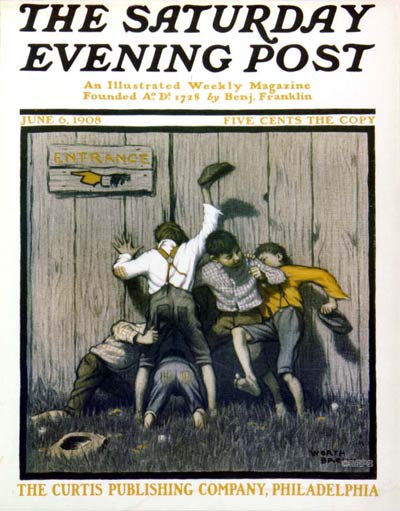
Worth Brehm
June 6, 1908
The A-Rod Factor: Cheating in America’s Favorite Pastime
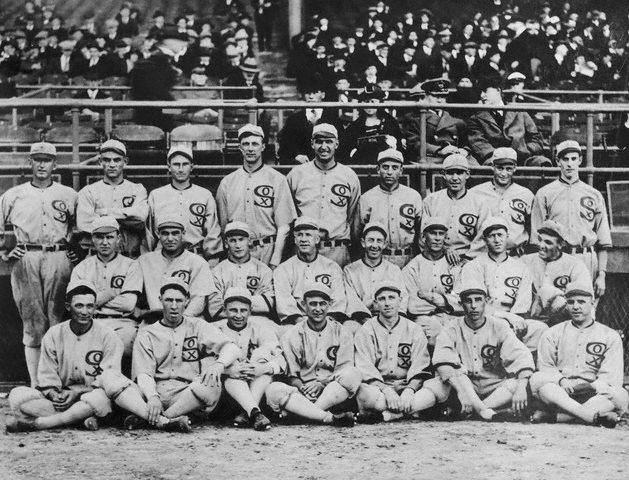
No one set out to make baseball the great national metaphor. It was just a game that involved a bat and a ball, played under a variety of rules and names, like “rounders,” “base,” or even “four-old-cat.” By 1828, it was being called “baseball” in newspapers, and by the 1840s there were league games in New England. It was played up to, and through, the Civil War. With the fighting ended, men who had learned the game while in uniform took it home with them, and its popularity grew throughout the states.
The growth of baseball was a welcome sign after the war. Americans yearned for indications that the nation was reuniting. They were encouraged by the growing number of baseball clubs, playing with roughly the same rules, that sprang up in both northern and southern states.
Even before the war, the U.S. had relatively few traditions and symbols that were valued in all states. Americans noted how European nations were united by common ancestries and ancient histories when their own country, in contrast, had an immigrant population that seemed to lack a distinctive character. And their national heritage was based on just one century of history.
Many of these same Americans looking for a national symbol thought it could be found in baseball. It seemed to reflect the principals of life in America–tough, but fair. It offered the boys and men (and sometimes ladies) who played the game a sense of achievement, cooperation, and friendly competition. And it was fun.
In 1902, the Post editors—clearly great fans of the game—were inspired to rhapsodize on the glories of baseball. “It is a manly game,” they said. And it was “a clean game. With a single exception, professional baseball has never been found to be dishonest.”
That single exception, they wrote, occurred in 1877, when players in the National League were “found guilty of throwing games.” They were expelled and have never since been permitted to play in or against a regularly organized team.” (They might have been referring to two St. Louis players, who gamblers had identified as their accomplices in a racket of throwing games.)
“The expulsion of the players above referred to took place,” the editorial continued, “and, with this, gambling became almost unknown in connection with baseball.”
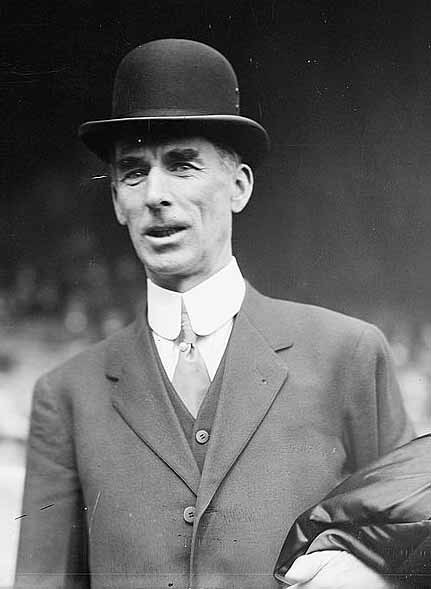
“There is no use in blinking at the fact that at that time the game was thought, by solid, respectable people, to be only one degree above grand larceny, arson and mayhem, and those who engaged in it were beneath the notice of decent society.”
Source: Library of Congress
So said the Post’s editors. But that’s not the way Cornelius McGillicuddy heard it. The man who later became known as Connie Mack, the widely respected manager of the Philadelphia Athletics, started his career as a ball player in Connecticut. And this is how he remembered that ‘clean’ game:
“There is no use in blinking at the fact that at that time the game was thought, by solid, respectable people, to be only one degree above grand larceny, arson and mayhem, and those who engaged in it were beneath the notice of decent society.
The late A. G. Spalding estimated that about 5 per cent of the players were crooks in the early days of professional ball. To quote Spalding: ‘Not an important game was played on any grounds where pools on the game were not sold. A few players became so corrupt that nobody could be certain whether the issue of any game in which they participated would be determined on its merits.’
Liquor selling, either on the grounds or in close proximity thereto, was so general as to make scenes of drunkenness and riot everyday occurrences, not only among spectators but now and then among the players themselves. Almost every team had its ‘gushers,’ and a game whose spectators consisted for the most part of gamblers, rowdies, and their natural associates could not attract honest men or decent women to its exhibitions.”
All this was unknown, forgotten, or ignored by the Post’s editors in the 1900s. In a 1908 editorial, for example, they broadly claimed that baseball represented the highest ideals of the nation—“our one, perfect institution.” It was “above reproach and beyond criticism…one comparatively perfect flower of our sadly defective civilization—the only important institution, so far as we remember, which the United States regards with a practically universal, critical, unadulterated affection.”
But just more than a decade later, the country learned that several players on the Chicago White Sox roster had conspired with gamblers to throw the World Series. The nation was stunned. Baseball fans might claim that players or umpires were throwing a game; it was the birthright of anyone who supported a losing team. But news of an actual conspiracy, by several players, to throw not just one game but the World Series, was outrageous.
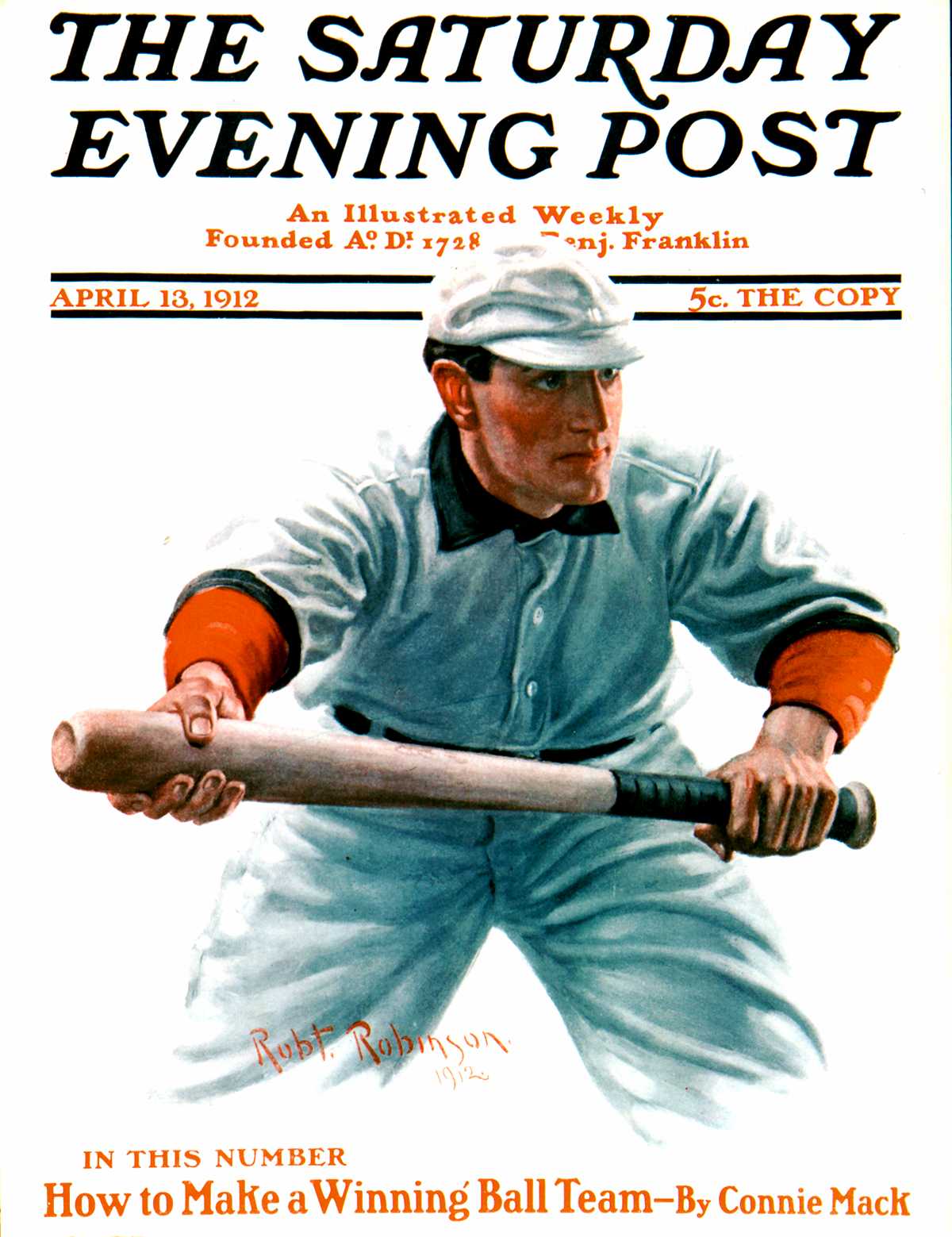
Recalling those times in 1938, sports writer John Lardner wrote in the Post, “It nearly wrecked baseball for all eternity… It touched off a rash of scandal rumors that spread across the face of the game like measles. A hundred players and half a dozen ball clubs were involved in stories of sister plots. Baseball was said to be crooked as sin from top to bottom.
And people didn’t take their baseball lightly in those days. They threw themselves wholeheartedly into the game when World War I ended, so much so that the sudden pull-up, the revelation of crookedness, was a real and ugly shock. It got under their skins. You heard of no lynchings, but Buck Herzog, the old Giant infielder, on an exhibition tour of the West in the late Fall of 1920, was slashed with a knife by an unidentified fan who yelled: “That’s for you, you crooked such-and-such.” Buck’s name had been mentioned by error in a newspaper rumor of a minor unpleasantness in New York…[He was] as innocent as a newborn pigeon, but rumors were rumors, and the national temper was high.
It’s a fact that some of the White Sox, after the scandal hearings, were unwilling to leave the courtroom for fear of mobs.
That anger at the game’s betrayal was seen recently when a ballplayer was charged with long-time abuse of performance-enhancing drugs. Some fans were outraged, and called for brutal punishment of the offender. Other fans merely shrugged their shoulders and accepted the fact that cheating was an ineradicable part of the game.
Corruption will always be a possible factor in the game. Even the Post’s 1902 editorial, while praising the purity of the game, recognized “the instant a sport reaches the professional stage it is beset by temptations which appeal to avarice, and must then begin a constant struggle to preserve its integrity and true sporting spirit.”
The struggle continues, with the suspension of Alex Rodriguez today and, no doubt, with future investigations, scandals, and penalties in the future. There will always be people looking to cheat at professional baseball, enriching themselves and impoverishing the game. And there will always be officials and players who work at stopping them and protecting the value of the game. It is this endless contest of corruption and restoration that makes professional baseball a true symbol of the United States.